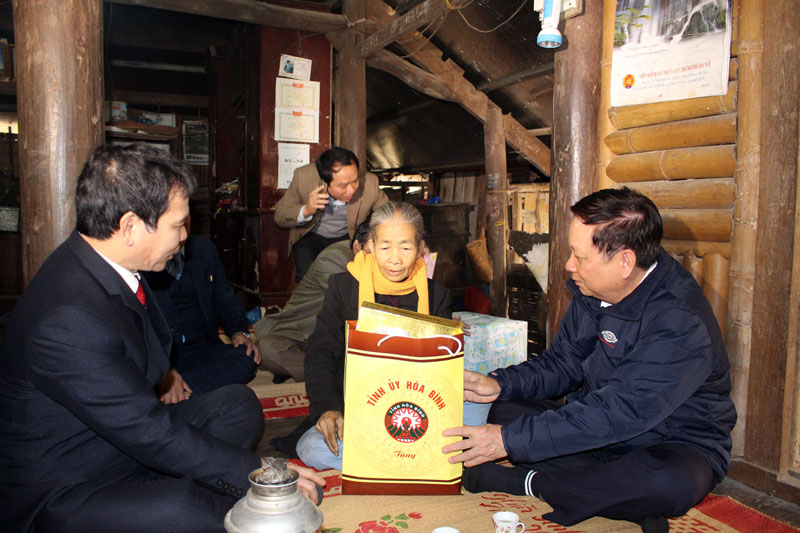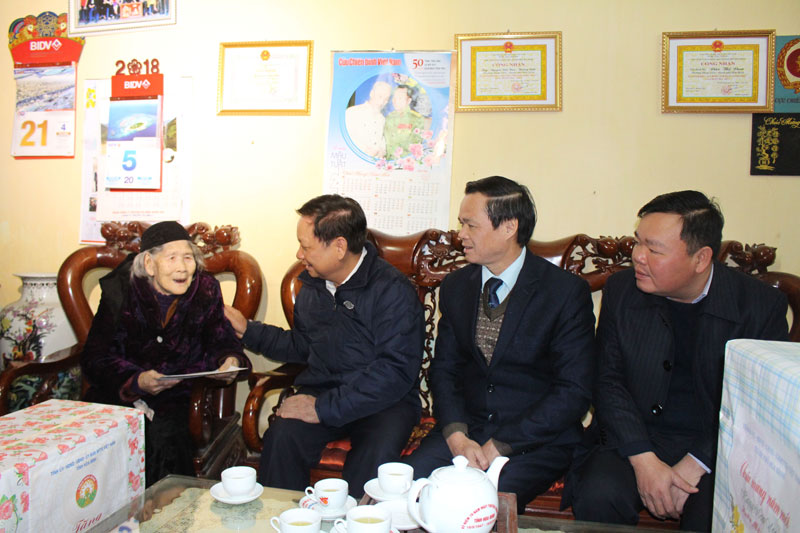
(HBO) – On the occasion of the traditional Lunar New Year 2018, a delegation from the northern province of Hoa Binh led by Secretary of the provincial Party Committee Bui Van Tinh visited senior revolutionaries, Vietnamese heroic mothers, and families of late local leaders in Kim Boi district and Hoa Binh city.
Bui Van Tinh extended his Tet greetings to families
of Bui Van Kin, late Secretary of the provincial Party Committee, in Kham
hamlet, Binh Son commune (Kim Boi district) and Nguyen Nhieu Coc, late
Secretary of the provincial Party Committee, in Cham Mat ward (Hoa Binh
city). On behalf of local authorities, Tinh presented gifts to families of the
two officials and wished them a prosperous new year.

Secretary
of the provincial Party Committee Bui Van Tinh visits family of Bui Van Kin,
late Secretary of the provincial Party Committee
Secretary
of the provincial Party Committee Bui Van Tinh visits Vietnamese heroic mother
Nguyen Thi Dan in Dong Tien ward (Hoa Binh city)
Afterwards, in Hoa Binh city, Secretary Bui Van Tinh visited Dang Huu Tin in
Phuong Lam ward, a senior revolutionary who made significant contributions to
building and developing revolutionary movements in the locality. He also
visited Vietnamese heroic mothers Nguyen Thi Dan (born in 1919) in Dong Tien
ward, and Nguyen Thi Cho (born in 1926), in Hoa Binh commune, whose children
laid down their lives in the resistance war against the US.
Secretary Bui Van Tinh handed over Tet gifts of the State President and the
province to the national contributors. He affirmed that the Party and State
always pay attention to policy beneficiary families and national revolutionary
contributors. He asked authorities at all levels to carry out more practical
activities to take better care of people who made remarkable contributions to
the cause of national building and development. He wished senior
revolutionaries and Vietnamese heroic mothers good health and hoped they will
continue educating their children about patriotism and national pride as well
as encouraging them to actively pursue learning and labour production to build
a well-off homeland./.
The Standing Board of the Hoa Binh provincial Party Committee has agreed in principle on a proposal by the Standing Board of the Party Committee of Hoa Binh city to gather feedback on the city’s 1:2000 zoning plan, which forms part of its broader urban development strategy.
Hoa Binh province has made notable progress in public administration reform and digital government development, with the satisfaction index among citizens and businesses reaching over 84%, according to recent government evaluations.
Thanks to great efforts by local authorities in recent times, the governance and public administration performance of Mai Chau district has been significantly improved.
In the afternoon of June 6, the Party Committee, the People's Council, the People's Committee and the Fatherland Front of Lac Son district solemnly held a meeting to celebrate the 139th anniversary of the district's founding (1886–2025) and the 79th anniversary of the establishment of the district's Party Committee (1946–2025). There was the attendance of Mr. Bui Van Thang, the Vice Chairman of the Provincial People's Council; Mr. Quach Tat Liem, the Vice Chairman of the Provincial People's Committee; Ms. Dang Bich Ngoc, the Deputy Head of the National Assembly Delegation of the province; as well as the former leaders of the province and district through various periods, who are the natives of the district.
Implementing the Politburo’s Resolution No. 57-NQ/TW on breakthroughs in science – technology, innovation, and digital transformation is a golden opportunity for the northern mountainous province of Hoa Binh to renew growth model, improve competitive edge and shorten digital gap.
Resolution 57-NQ/TW, issued by the Politburo on December 22, 2024, identifies sci-tech, innovation, and digital transformation as strategic breakthroughs to build a developed and prosperous nation. In Hoa Binh province, this spirit is not just a slogan, it’s being put into action through concrete initiatives that form a "new development triangle”: digital citizenship, digital economy, and digital administration.




